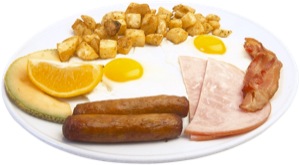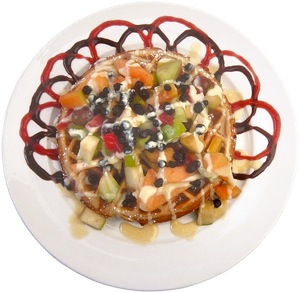-
- N.H. civil unions analyzed
- Civil unions could be boost for N.H. businesses, tourism
- First openly gay president of black journalists group dies
- Republican Mike Huckabee explains anti-gay stances
- New season of ‘L Word’ tackles military’s ‘Don’t ask, Don’t tell’ policy
- Neptune, N.J., elects openly gay mayor
- National News Briefs
- World News Briefs
health & sports
Fit for Life
Managing your morning meal
Published Thursday, 03-Jan-2008 in issue 1045
By now, most of you have already heard that breakfast is the most important meal of the day. Despite knowing this, many still eschew the morning meal for lack of time, or, worse yet, the misconception that eating less (or nothing at all) will reduce daily caloric intake and fast-track an improved body composition. The truth is breakfast is a very important meal; missing out on it can derail your fitness efforts, and leave you without much-needed energy throughout your day. This article will discuss the benefits of including breakfast in your daily routine, and give you tips for integrating it into your hectic day.
Weight management
Six packs beware! While calorie restriction seems the most logical method for achieving a chiseled midsection, avoiding breakfast can have the potential to increase your fat stores and keep that spare tire from deflating in a timely fashion. According to several research reports, those who regularly eat breakfast are more likely to maintain a healthy weight. One study of 2,959 participants cited eating breakfast seven days a week as one of the key factors in their maintaining a 30-pound weight loss for more than a year. Another study showed that non-breakfast eaters were four times more likely to be obese. The reason for this involves the metabolism. First, when skipping breakfast, your metabolic rate slows which also results in a drop in blood sugar. When this occurs, the body loses energy and begins to crave foods that are high in sugar in order to get a jump start on functioning properly. But high sugar means lots of calories that will be used up quickly, setting you up yet again for another high sugar binge to maintain energy levels. Another study found that those who eat breakfast were also more likely to exercise regularly, which is an essential aspect of weight loss and management.
Decreased disease risk
While eating a healthy breakfast is important for weight management, it is also very important in maintaining optimal health. Emerging research has shown a higher incidence in diseases such as type 2 diabetes and cardiovascular disease, according to the American Heart Association. This may be a result of binging on foods that are high in fat and sugar which have been shown to have a correlation to such diseases. Eating a nutritional breakfast can also introduce many heart-healthy vitamins and nutrients into the diet. Of course, type 2 diabetes and cardiovascular disease can yield serious health issues if left unaddressed, and the intervention of a qualified physician is highly recommended prior to proactively treating the diseases.
Brain function
When you arrive to work or school on an empty stomach, have you noticed a lack of concentration, creativity and efficiency? According to a growing body of research, students who regularly eat breakfast are more likely to do well on tests, retain information in class and maintain excellent attendance. Such studies are not just related to students. Several studies of older and middle-aged adults also yielded promising cognition results as related to regular breakfast consumption. Across the board, those who ate before participating in memory tests scored higher than those who didn’t. Despite its small size, the brain actually requires about 30 percent of total caloric intake to perform at its optimum. Any less than that and the brain will not be able to perform even the most rudimentary of tasks such as remembering where you left your briefcase. The brain is also hard at work while we rest during the night, continuing to utilize nutrients while we sleep. A healthy breakfast will help replace those nutrients.
Breakfast tips for the busy body
The working breakfast: If you’re like me, you wait until the very last minute before hopping out of bed in the morning. The majority of people claim they don’t have enough time in the morning to eat breakfast. So, more often than not, this means that many of us race to get prepared for work and rush out the door before eating anything. While you may think you are too busy to eat, experts say that this is not the case. With a little bit of proactive preparation, you can make sure that you don’t miss out on the most important meal of the day. For example, three days a week I work as an associate editor for a trade publication. I have my own office and desk so I have the opportunity to eat my breakfast as I sift through the morning’s e-mails. I keep a drawer full of heart healthy goodies that require minimal preparation (oatmeal, fruit, nuts, etc.).
• Eating on the go: Others who cannot eat while working might try to prepare an on-the-go breakfast the night before so as not to waste time in the morning. Make sure that, if you plan to eat during your commute that you prepare something that will not inhibit your ability to drive safely.
• Keep it simple: While a leisurely Saturday morning breakfast might involve some elaborate concoction, a sufficient and healthy weekday breakfast can be kept simple and efficient. For example, try a piece of high fiber, whole grain toast with peanut butter and bananas. If toast isn’t your bag, substitute it for a more “handy” tortilla that you can roll up for a great, portable morning snack. Anything that is high fiber and nutrient dense will prevent late morning binge eating and will keep your brain functioning at maximum capacity throughout the day.
• Bag the bagel: While eating bagels seems a healthy alternative to the donut, it can be a disastrous addition to your diet. One average-sized bagel is the equivalent of about five slices of easily digestible carbohydrate laden bread. While carbohydrates are a necessary component of most diets, it’s important to look for those that take a while for the body to burn through. This leads to sustained energy, less snacking on non-healthy foods and greater nutrient intake.
• Make the time: While you may think there isn’t enough time in the day for breakfast, chances are there is. Waking 10 minutes earlier may afford you time enough to put together a healthy snack that you can take with you on the road. This may mean getting to bed a little earlier or preparing a snack ahead of time.
There are many reasons why eating a healthy breakfast is a necessary component of a healthy lifestyle. If you are one of the millions of people who skip out on this all-important meal, challenge yourself to eat breakfast at least once a week. Keep a small log of what you ate, and how you felt at various times throughout the day. Pay attention to your level of concentration, memory, energy level and emotional states. If you find that you generally feel better on days that you eat breakfast, slowly integrate it into more days of the week. Eventually what once seemed impossible will become habitual and you’ll be well on your way to a more healthy you. Here’s to a healthy breakfast!
|
|
Copyright © 2003-2025 Uptown Publications




